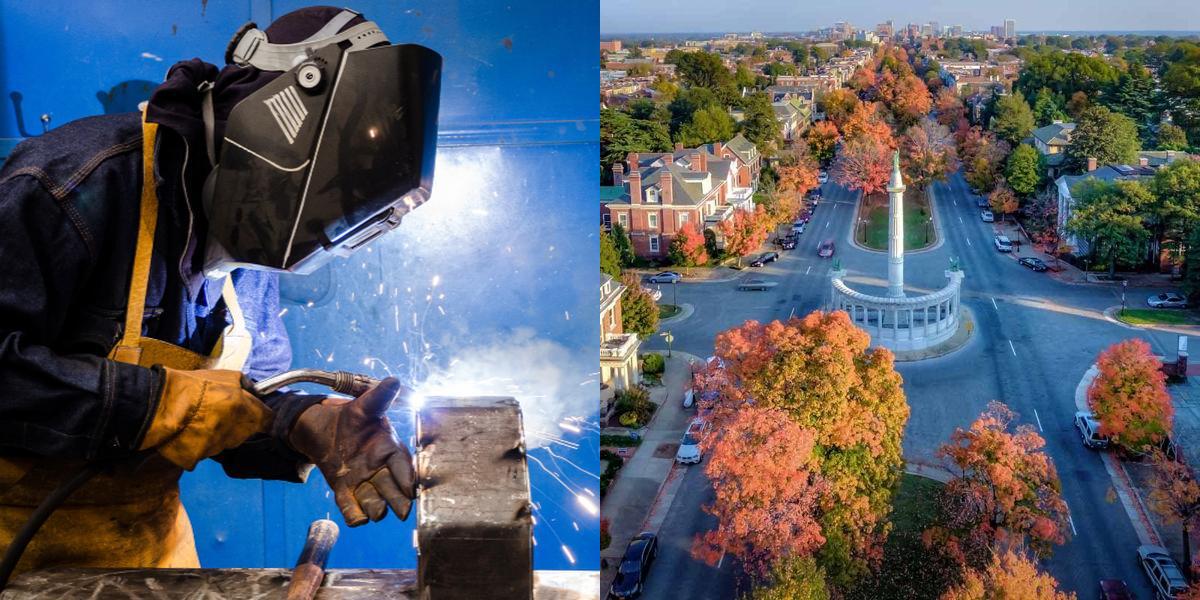How to Become a Welder in Virginia (2025)

From the massive shipyards of Newport News to manufacturing plants and new construction sites, Virginia's economy is built on skilled trades. A career as a welder in Virginia offers a path to a stable, in-demand, and well-paying job, with professionals in the state earning a median salary higher than the national average. Nationally, welders earn a median of $48,940 per year (BLS, May 2023), but the demand in Virginia pushes that figure even higher.
This guide breaks down the essential steps to get your training, earn the right certifications, and start your welding career in the Commonwealth.
Career Paths and Opportunities after Becoming a Welder
After becoming a certified welder and gaining some experience in the field, there are numerous career paths and opportunities available to you. Here are a few potential paths you can explore:
1. Welding Technician/Inspector
If you have a keen eye for detail and enjoy ensuring quality and safety, a career as a welding technician or inspector may be a good fit for you. Welding technicians are responsible for inspecting welds, ensuring they meet industry standards and specifications.
To become a welding technician or inspector, you may need to obtain additional certifications, such as the Certified Welding Inspector (CWI) certification offered by the American Welding Society (AWS).
2. Welding Supervisor/Foreman
As you gain experience and develop leadership skills, you may have the opportunity to advance to a supervisory or foreman role. Welding supervisors oversee and coordinate welding projects, manage a team of welders, and ensure that work is completed safely and efficiently.
In addition to your welding certification, you may need to acquire additional certifications or training in project management and leadership to excel in this role.
3. Welding Engineer
If you have a strong aptitude for math and science, a career as a welding engineer may be a good fit. Welding engineers are responsible for designing, developing, and implementing welding processes and procedures.
To become a welding engineer, you will typically need a bachelor's degree in welding engineering or a related field. Additional certifications, such as the Certified Welding Engineer (CWE) certification offered by the American Welding Society (AWS), can also enhance your career prospects.
4. Specialized Welding
As a certified welder, you may have the opportunity to specialize in a specific type of welding, such as underwater welding, pipe welding, or aerospace welding. Specializing in a niche area can open up unique and high-paying job opportunities.
Specialized welding often requires additional certifications, training, and experience, but can be a rewarding and lucrative career path.
5. Entrepreneurship
If you have an entrepreneurial spirit, you may consider starting your own welding business. This can give you the freedom to choose your clients, projects, and work schedule.
Starting a welding business requires careful planning, knowledge of local regulations, and excellent business management skills. However, it can be a fulfilling and financially rewarding venture for those willing to put in the effort.
Frequently Asked Questions
Is Virginia a good state for welders?
Yes, Virginia is an excellent state for welders. It has a higher-than-average concentration of welding jobs, particularly due to the massive shipbuilding industry in the Hampton Roads area (Newport News, Norfolk, Portsmouth) and significant manufacturing and construction sectors. This demand also contributes to an average salary that is higher than the national median.
How much does welding school cost in Virginia?
The cost varies. A short-term certificate program from a community college or technical institute can range from $3,000 to $7,000. A 2-year associate's degree will cost more, ranging from $10,000 to $20,000+ in total tuition and fees, but many students at Virginia's community colleges may qualify for financial aid or G3 "Get a Skill, Get a Job, Get ahead" grants, which can make training free for those who qualify.
What is the highest-paying welding job in Virginia?
The highest-paying jobs are typically for specialized welders. Pipe welders (especially those who can weld in all positions, or "6G"), TIG welders (who work with aluminum and stainless steel), and shipyard welders with multiple certifications and experience in specific naval processes often command the top salaries in the state, with some experienced pipe welders earning $30-$50 per hour.
Do I need a state license to weld in Virginia?
No, Virginia does not issue a state license for welders. Your primary credential is your AWS (American Welding Society) certification. While you can find entry-level helper jobs without it, almost all professional, high-paying welding jobs will require you to be certified.
Final Thoughts
Becoming a certified welder opens up a world of opportunities in a wide range of industries. By following the steps outlined above, you can obtain your welding certification, find a job as a welder, and explore various career paths within the welding industry.
Remember to continue learning and improving your skills as a welder to stay competitive in the job market. Whether you choose to become a welding technician, supervisor, engineer, or start your own business, a career in welding can be fulfilling, lucrative, and offer long-term stability. Start your journey towards becoming a welder in Virginia with Dreambound today!
Looking for a better fit? These other articles could be more in line with your expectations if this one isn't precisely what you had in mind:

Vduani Martinez is a part of the Growth team at Dreambound. She creates and fixes workflows and automation to guarantee seamless operations. On top of that, she manages databases to ensure all information is up to date. Vduani is a licensed Electronics Engineer who loves coffee and is a travel enthusiast. Out of the office, she enjoys going on road trips and discovering new cafes and restaurants.





